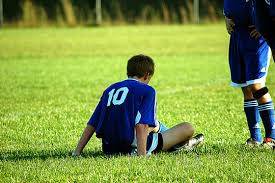Concussion in Sport- Is your Child at Risk?
Tuesday, December 23, 2014

You're watching your child play a school football match when he takes a nasty fall. He gets up, stumbles around a little but seems aware of where he is. Then you realise other team mates are talking to him and he's having a hard time understanding them. He seems confused, dazed and sluggish.
Your child has likely sustained a concussion. Recognise the signs and seek immediate treatment, you may just prevent a serious brain injury.
About Concussion
A concussion happens when the brain kind of rattles around in the skull after a blow to the head. While the brain is cushioned by spinal fluid from minor bumps, heavier impacts can cause the brain to hit into the skull bone. This may result in damaged blood vessels and a bruised brain. Nerve damage may also be a risk.
Concussion in Children
Since children and teenagers are still developing, they're at greater risk of suffering concussion compared to adults. And it takes them longer to recover.
Not all concussions happen during contact sports. Soccer and football injuries are common; but so are playground activities, riding bicycles, fights, car accidents or minor falls.
Kids who get concussions usually recover within a week or two without lasting health problems, by following certain precautions and taking an adequate break from sport and other activities that make the symptoms worse.
Detecting Concussion
Concussion isn't always easy to spot- some symptoms don't show up right away. Signs and symptoms can develop 24 to 72 hours after the incident.
Concussion isn't something you can actually feel or see; you can only really detect it from certain symptoms and how the effected person's brain seems to be processing information. The three main categories of symptoms are physical, cognitive, emotional and sleep-related.

Signs To Watch Out For
If your child sustains a hard blow to the head during a sports match or even during playtime, lookout for the following symptoms:
Physical
- Headache
- Blurred or Double Vision
- Dizziness
- Nausea or Vomiting
- Difficulty with Balance and Co-Ordination (e.g difficulty catching ball, performing basic task)
- Sensitivity to light or noise
Cognitive
- Stunned, confused or dazed
- Your child seems to answer questions slowly
- Confusion about surroundings or about what he or she is doing
- Trouble with remembering what happened before or after the impact
- Slurred speech or speaking without making sense
- Behaving out of character
Emotional
- Anxiety
- Feeling Sad for no reason
- More Emotional than usual
Sleep Related
- Sleeping more or less than usual
- Sleepiness
- Difficulty falling asleep
Anyone showing any of these signs should seek medical attention.
After Diagnosis
If your child is diagnosed with concussion, keep him or her away from sports for as long as it takes the brain to recover. Research has discovered that a brain that is recovering from concussion is highly susceptible to further injury should a second injury to the head occur.
The brain becomes compromised by the first blow, so it's already vulnerable. Therefore, it won't need as much trauma second time around to cause another concussion.
If a brain experiences repeated concussions, it's at greater risk of memory loss, chronic headaches, cognitive issues, Alzheimer's and even epilepsy.
Protect Your Child from Concussion
To protect your child from the risk of concussion, ensure they wear the correct safety gear for the sports they are playing. If a helmet is required, ensure that it fits correctly and that your child uses it as instructed.
Training is important in preventing concussion too. Coaches should focuses on play as well as proper stances and correct moves to ensure kids aren't injured during matches or practice sessions.
